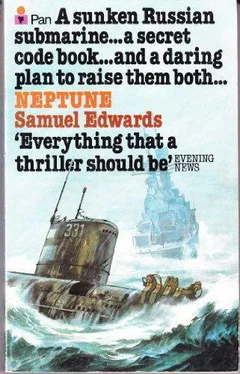Samuel Edwards - Neptune
Здесь есть возможность читать онлайн «Samuel Edwards - Neptune» весь текст электронной книги совершенно бесплатно (целиком полную версию без сокращений). В некоторых случаях можно слушать аудио, скачать через торрент в формате fb2 и присутствует краткое содержание. Город: London, Год выпуска: 1978, ISBN: 1978, Издательство: Pan Books, Жанр: Шпионский детектив, Триллер, на английском языке. Описание произведения, (предисловие) а так же отзывы посетителей доступны на портале библиотеки ЛибКат.
- Название:Neptune
- Автор:
- Издательство:Pan Books
- Жанр:
- Год:1978
- Город:London
- ISBN:0-330-25006-X
- Рейтинг книги:4 / 5. Голосов: 1
-
Избранное:Добавить в избранное
- Отзывы:
-
Ваша оценка:
- 80
- 1
- 2
- 3
- 4
- 5
Neptune: краткое содержание, описание и аннотация
Предлагаем к чтению аннотацию, описание, краткое содержание или предисловие (зависит от того, что написал сам автор книги «Neptune»). Если вы не нашли необходимую информацию о книге — напишите в комментариях, мы постараемся отыскать её.
The Russian atomic submarine ZOLOTO lies crippled and abandoned on the bed of the South China Sea. The secrets entombed inside are vital to both east and west. A custom-built super-dredger NEPTUNE assembled under maximum secrecy and plagued by agents of Soviet Russia and Red China, is bound on a clandestine salvage operation to capture the prize that could mean nothing less than world domination…
Neptune — читать онлайн бесплатно полную книгу (весь текст) целиком
Ниже представлен текст книги, разбитый по страницам. Система сохранения места последней прочитанной страницы, позволяет с удобством читать онлайн бесплатно книгу «Neptune», без необходимости каждый раз заново искать на чём Вы остановились. Поставьте закладку, и сможете в любой момент перейти на страницу, на которой закончили чтение.
Интервал:
Закладка:
‘As I’ve told you,’ Richards said, ‘the actual float we intend to use in Project Neptune is stored elsewhere in the building in separate sections and will be flown to us in the Pacific after we put out to sea. What you’ll see here is the original scale model we constructed before we built the float itself.’
At the far end of the tank Porter saw a heavy metal claw extending from a wall. ‘I assume that’s electromagnetic,’ he said, ‘and represents the much bigger claws we saw on board the Neptune.’
‘Correct.’ Richards opened a sliding board in the wall, which revealed a large panel of dials and switches. He began to push buttons, and soon lights in green, white, and red were glowing.
‘How many people have seen this gadgetry, Mr Richards?’
‘We’ve given demonstrations for the President, the Secretary of Defence, three admirals and the Director of the Corporation,’
‘No one else?’
‘A number of scientists and naval architects, of course—’
‘How many?’
‘Perhaps eight or ten in all. Every one of them has a top security clearance, naturally and—’
‘I’d like Adrienne supplied with a complete list of names. Today,’
‘But they’ve already been checked.’
‘They’ll be checked again,’ Porter said. ‘There must be no potential leaks, particularly if your machinery performs as you say it does.’
‘Watch,’ Richards said, and an overhead pair of cranes appeared out of the ceiling, each holding a thick metal bar. ‘We had to prove to ourselves that our float was capable of doing what we demand of it, so even this demonstration equipment is rather impressive. Each of those bars weighs a half-ton.’
Porter watched as the bars were lowered into the water and dropped to the bottom of the tank. ‘American-Canadian or English?’
‘The US-Canadian ton; two thousand pounds. Only you English would invent a ton of twenty-two hundred and forty pounds. I’ll be relieved when all of us switch to the metric system.’ Richards punched several buttons, ‘Here we go.’
A sliding door just above water level opened, and Porter stared at a strange contraption that came slowly into view. About ten feet long and approximately five feet wide, it resembled an aluminium raft, with a thick lip of a darker, heavier metal.
Richards replied to his unasked question. ‘The iron shot we use as ballast is stored in the outer rim. The beauty of this design is its simplicity.’
Porter leaned forward to examine the under portion of the float, a sturdy, tank-like contraption that looked somewhat like a torpedo with two rounded ends. ‘That’s your power tank?’
‘Right. We experimented with every known kind of gasoline, and finally settled on a high-octane aviation petrol. It compresses very quickly, and drags the float down. We’re using the wrong terminology, actually, when we call this machine a float. It would be proper to refer to it as a self-submersible.’
The miniature football field settled on the surface of the water, and a long hose came out of the wall and attached itself to the underside.
‘Wherever possible,’ Richards said, ‘we’ve automated. In this way we leave as little as possible to chance, and we minimize the possibilities that human error in a time of tension can cause improper functioning.’
Porter said nothing as the tank was filled with gasoline.
‘We’re all set,’ Richards said, and when he tugged down a switch the hose disconnected itself and was swallowed up into the wall.
‘You’ll send down no observers in a bathyscaphe, or any divers?’
‘That would complicate the operation. Remember we’ll be hauling up an object from a depth of more than sixteen thousand feet, and if people are involved down there, the protection of their lives becomes our first consideration. The one piece of equipment the model lacks is the closed-circuit television cameras that we’ll use on the real float.’
‘I’m sure television will be a help,’ Porter said, ‘but as a layman I can’t understand how this raft can seek out – and find – an object at the bottom of the sea.’
Franklin Richards laughed. ‘That was our most difficult problem, and we solved it by using a float. We wanted as large a surface as possible to create a field for our electromagnets. The entire under-side of the float’s surface is equipped with the most powerful, sensitive magnets ever made. As you’ll soon see.’ He pulled a large switch.
The submersible float began to descend, gaining speed as it dropped towards the bottom of the tank.
‘The magnets,’ Richards said, ‘seek their own target. In an area the size of this pool there’s no problem in locating the metal bars, while in the actual operation we’ll need our television cameras to help guide us to the submarine.’
Porter could scarcely believe what he was seeing. The float reached the bottom of the tank, then moved unerringly towards the two metal bars. In a few minutes it settled over them.
‘Now,’ Richards said, ‘we need human intervention to guide the next step.’ He pressed several small buttons.
One side of the submersible’s lip opened, and small pieces of iron were discharged.
‘If the magnetic field is so powerful, why don’t the chunks of iron cling to it?’
‘They’ve been treated to make them antimagnetic. There will be special equipment on board the Neptune to perform that function just before the iron shot is loaded on to the float. Even treated iron remains antimagnetic for only a short time.’
The float, with a load of shot released from one side, was now tilting.
‘We’ve now come to the critical part of the operation,’ Richards said. ‘We must transfer the drawing power of the magnetic field from the bottom of the float to the top. This must be done gradually, so we don’t lose physical contact with the object or objects we want to raise to the surface.’
Porter watched him manipulating a series of plunger-like wires, and he looked like a puppeteer tugging at multiple, connected strings.
The two heavy metal bars, each weighing 1,000 pounds, inched towards the float.
Richards, totally absorbed in his operation, was perspiring heavily, even though the large chamber was air conditioned.
One of the metal bars seemed to hesitate at the lip of the float, then rolled over it and settled on the top.
Richards held his breath as he manipulated the wires, his touch light.
The second bar reached the lip, fell away and then moved forward again.
‘That’s it, baby. Easy now.’ Franklin Richards had no idea he was speaking aloud.
The bar was drawn up over the lip, rolled on to the float and landed a few inches from its companion.
Porter discovered that he was sweating, too, and he wiped his upper lip and forehead.
‘Now,’ Richards said, ‘we increase the electromagnetic pull to ensure that the objects don’t fall off when the submersible is raised.’
He pulled yet another switch, and a humming sound filled the chamber.
Porter realized that, until this moment, the operation had been silent.
The wire plungers disappeared into their sockets.
‘Next,’ Richards said, ‘we jettison the rest of the iron shot.’
The three remaining sides of the lip opened, and small chunks of iron were expelled gradually. As they were propelled away from the submersible it began to rise.
‘The gasoline decompresses as the float moves back towards the surface,’ Richards said. ‘That is another factor in the ascension. Theoretically, if we ran into serious trouble we could jettison the fuel, too, but I’d hesitate before I’d try it. The submersible might rise to the surface so fast that the magnetic field wouldn’t be strong enough to hold the metal objects in place. If they fell off or slid off – or whatever – they’d sink to the bottom again, and we’d have to repeat the entire operation from scratch. I hate to think of what might happen to the Zoloto under such circumstances. Weighing as much as it does, it might be subjected to so much stress that it would crack and come apart. And that would mean the end of Project Neptune.’
Читать дальшеИнтервал:
Закладка:
Похожие книги на «Neptune»
Представляем Вашему вниманию похожие книги на «Neptune» списком для выбора. Мы отобрали схожую по названию и смыслу литературу в надежде предоставить читателям больше вариантов отыскать новые, интересные, ещё непрочитанные произведения.
Обсуждение, отзывы о книге «Neptune» и просто собственные мнения читателей. Оставьте ваши комментарии, напишите, что Вы думаете о произведении, его смысле или главных героях. Укажите что конкретно понравилось, а что нет, и почему Вы так считаете.












